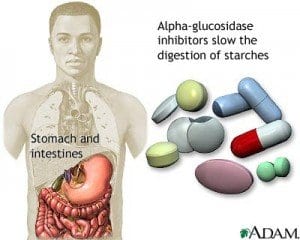 Alpha-Glucosidase Inhibitors are a group of Diabetic medicines that help block the enzymes that breakdown particular carbohydrates in the upper area of the small intestine. This group of medicines is sometimes known as “starch blockers.” These medications are taken with the first bite of a meal, as they are perfect for treating postprandial hypoglycemia which is a quick rise in blood sugar after a meal.
Alpha-Glucosidase Inhibitors are a group of Diabetic medicines that help block the enzymes that breakdown particular carbohydrates in the upper area of the small intestine. This group of medicines is sometimes known as “starch blockers.” These medications are taken with the first bite of a meal, as they are perfect for treating postprandial hypoglycemia which is a quick rise in blood sugar after a meal.
Alpha-Glucosidase Inhibitors were first made available in the United States in the year 1995. Acarbose (Precose) was the first medication of its class to be approved. In 1999, Miglitol (Glyset) was introduced. These help people who suffer from either Type 1 or Type 2 Diabetes.
This class of drugs helps stop immediate breakdown of starches into monosaccharide, or sugars. These would usually be absorbed in the bloodstream rather quickly, with the carbohydrates being absorbed more in the small intestine or close to the colon. When using this medication, it will help slow the absorption which will allow time for the pancreas to produce the right amount of insulin needed for the meal ingested.
Alpha-Glucosidase Inhibitors can be used with other types of medications and interact well. Used alone, Alpha-Glucosidase Inhibitors will not cause glucose sugar levels to go down, but if they are combined with other medications, there is a possibility of hypoglycemia occurring. Since these medications slow the absorption times, it will also slow down the effects you would normally get by drinking juice or eating a food with sugar when hypoglycemia happens. The best way to make sure you are prepared incase this occurs is by keeping pure glucose in gel or tablets with you.
Alpha-Glucosidase Inhibitors have side effects that many people may not want to bother with. Since these drugs affect the carbohydrate absorption in the small intestines, it can cause the individual to feel bloated, nauseous, and have gas and diarrhea. These side effects seem to dwindle away with time, but an easier way to avoid them altogether is by starting the doses off small and gradually working up to the most effective strength.
There are not been many studies done that involve children with Type 2 Diabetes taking a drug from this class. The FDA has not approved these for children as of now. Since most of these medications are fine for adults, many Doctors are still prescribing them for children with Diabetes.
The reason Alpha-Glucosidase Inhibitors are popular is because they have been proven to help people with Type 2 Diabetes who still cannot manage their blood sugar levels even with their diets and exercising. These medications are ideal for people who were just diagnosed with Type 2 Diabetes with their sugar levels only a little over for Diabetes.
If you are interested in Alpha-Glucosidase Inhibitors, it might be a great option for you to look into. Talking with your doctor will help you see if it is right for you. You want to make sure it will interact with any other medications you might be taking. Choosing an Alpha-Glucosidase Inhibitor can help you maintain a good blood sugar level and give you more freedom.